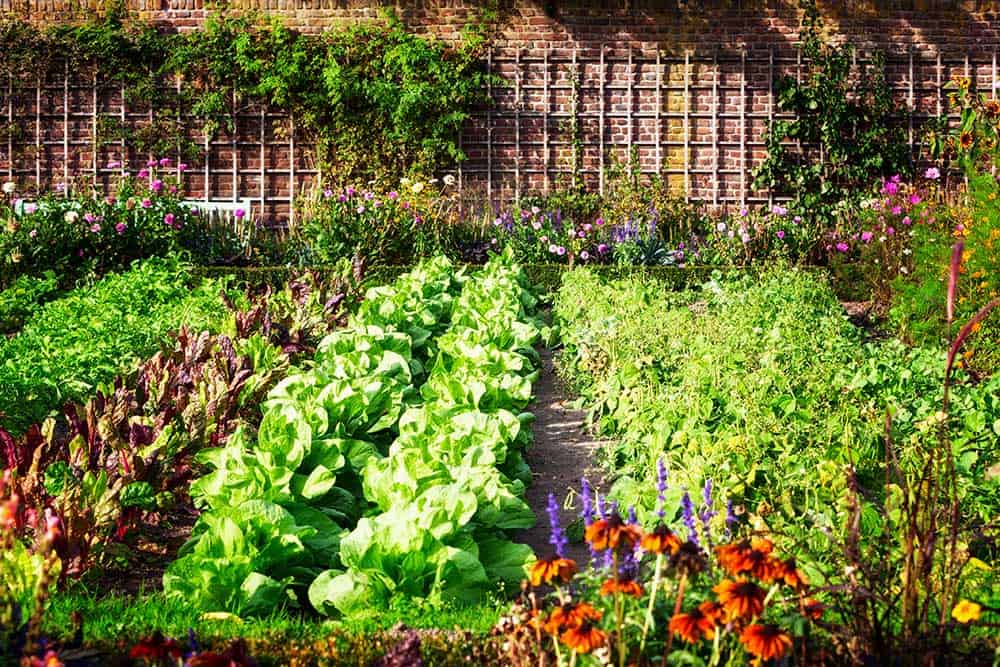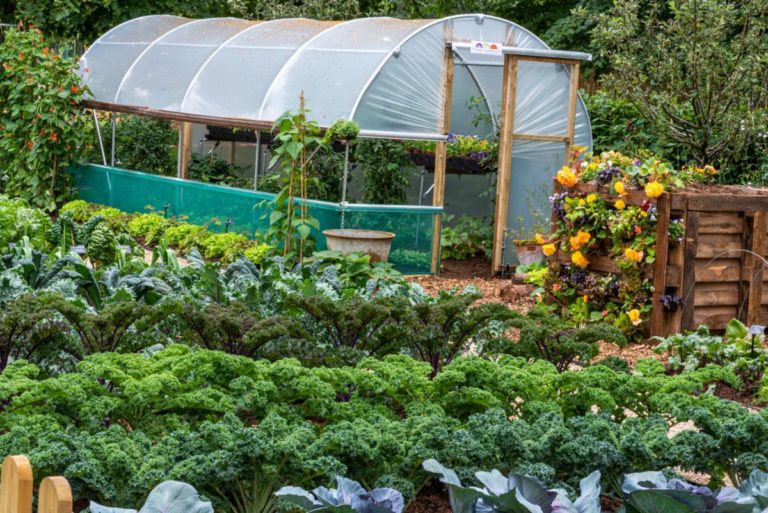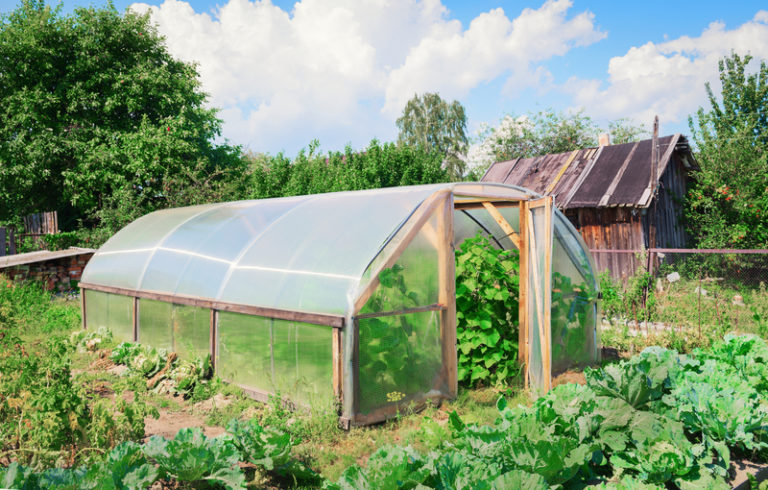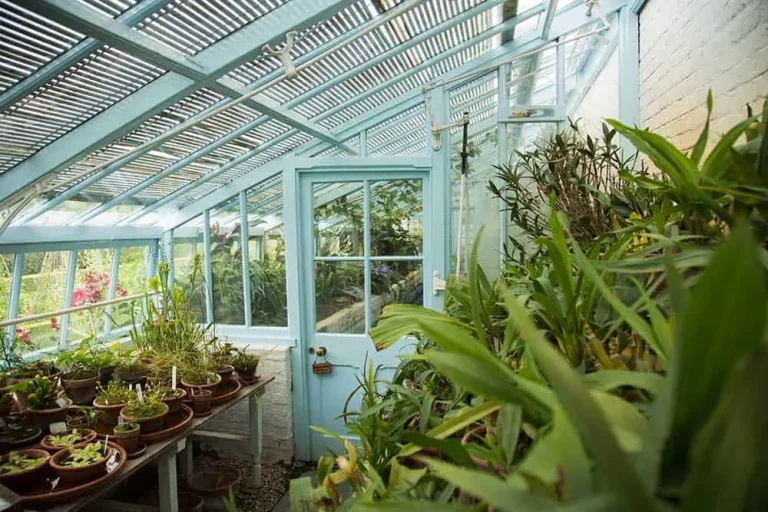Growing your own food is a rewarding and empowering experience that offers numerous benefits.
Not only does it allow you to eat fresh, healthy produce straight from your own land, but it also connects you with nature and gives you a sense of accomplishment.
By raising your own food, you can escape the dependence on industrial agriculture and grocery stores, instead relying on your own hard work and self-sufficiency.
With homesteading, you’ll learn valuable skills like garden planning, soil preparation, irrigation systems, composting, and animal husbandry – all of which will help you live off the grid and sustainably.
We’ll explore the ins and outs of raising your own food on an off-grid homestead, from choosing the right crops to managing pests and diseases.
Whether you’re just starting out or looking to expand your current operation, our comprehensive manual will help you achieve a more self-sufficient lifestyle through the power of raise-your-own food.
Control over your food supply
When you raise your own food, you have complete control over what you grow and how it’s grown. This means you can avoid using harmful chemicals or genetically modified organisms (GMOs), and instead choose to use natural and sustainable farming methods.
By raising your own food, you have complete control over what you grow and how it’s grown.
This means you can avoid using harmful chemicals or genetically modified organisms (GMOs), and instead choose to use natural and sustainable farming methods.
For example, you can use compost and crop rotation to maintain soil health and fertility, and choose heirloom varieties that are better suited to your local climate and soil conditions.
By growing your own food, you can also avoid the use of pesticides and herbicides, which can be harmful to both humans and the environment.
You can choose to use sustainable farming practices such as permaculture and agroforestry, which promote biodiversity and ecological balance.
By taking control of your food supply, you can ensure that your food is not only safe and healthy, but also sustainable and environmentally friendly.
Cost savings
Raising your own food can save you money in the long run. Instead of buying expensive groceries from the store, you can grow your own food at home and enjoy fresh, nutritious produce without breaking the bank.
One of the most significant benefits of off grid living and homesteading is the cost savings of raising your own food.
By growing your own fruits, vegetables, and livestock, you can save money on your grocery bills and enjoy fresh, nutritious produce without breaking the bank.
According to a study by the National Resources Defense Council, the average American family spends over $1,500 per year on groceries.
By contrast, homesteading can provide you with a significant portion of your own food for just a fraction of that cost.
For example, a single tomato plant can produce up to 20 pounds of tomatoes per season, which can be used in a variety of dishes, from salads and sandwiches to pasta sauces and salsas.
Similarly, a single chicken can provide up to 300 eggs per year, which can be used in baked goods, omelets, and other dishes.
By raising your own food, you can save money on groceries and enjoy fresh, healthy produce all year round.
In addition to saving money, homesteading can also provide you with a sense of self-sufficiency and satisfaction that comes from knowing where your food comes from and how it’s grown.
By raising your own food, you can control the quality of your produce and ensure that it’s grown without harmful chemicals or pesticides.
Plus, homesteading can be a fun and rewarding hobby that can bring you and your family closer to nature and the rhythms of the seasons.
Overall, raising your own food is a great way to save money, eat healthier, and connect with nature.
Living off the grid and practicing homesteading can be a highly rewarding and cost-effective lifestyle choice.
By raising your own food, you can save money on groceries and enjoy fresh, healthy produce all year round.
Not only can you save money, but you’ll also have the satisfaction of knowing exactly where your food comes from and how it was grown.
Even if you only have a small amount of space, you can still start small and experiment with different homesteading techniques to see what works best for you.
With the right resources and a little bit of know-how, you can start living off the grid and enjoying the many benefits of self-sufficient living.
Freshness and quality
Store-bought produce can sit on shelves for days or even weeks before it’s purchased, which can affect its freshness and nutritional value. When you grow your own food, you can harvest it at the peak of freshness and enjoy the best possible taste and quality.
Off-grid living homesteading offers numerous benefits when it comes to accessing fresh, high-quality produce.
Store-bought produce is often picked before it’s ripe and then transported long distances, which can lead to a loss of nutrients and a decrease in freshness.
In contrast, when you grow your own food, you can harvest it at the peak of freshness, ensuring the highest nutritional value and optimal taste.
The produce is picked at the exact moment it’s ready to be eaten, preserving its natural flavor and texture.
This means that the fruits and vegetables are more likely to be crunchy, juicy, and bursting with flavor.
By growing your own food, you can control the growing conditions, ensuring that your produce is grown without the use of harmful pesticides or herbicides, resulting in a healthier and more sustainable food source.
By adopting off-grid living homesteading practices, you can enjoy a steady supply of fresh, healthy, and delicious produce right in your own backyard.
Better health and nutrition
Homegrown produce is often more nutritious than store-bought options, as it’s grown in a way that preserves the natural nutrients and flavor. you can choose to grow heirloom varieties that are rich in antioxidants and other beneficial compounds.
One of the most significant advantages of off-grid living and homesteading is the ability to grow your own produce, which can lead to better health and nutrition.
Homegrown produce is often more nutritious than store-bought options because it’s grown in a way that preserves the natural nutrients and flavor.
By avoiding the use of harmful pesticides and other chemicals, you can grow heirloom varieties that are rich in antioxidants and other beneficial compounds.
Heirloom varieties are open-pollinated, non-GMO seed varieties that have been passed down through generations and are often more flavorful and nutritious than modern hybrid varieties.
By choosing to grow heirloom varieties, you can enjoy a more diverse and nutritious diet, which can lead to better overall health and well-being.
The physical act of gardening and tending to your land can provide exercise and mental well-being, further contributing to a healthier lifestyle.
Self-sufficiency
Growing your own food allows you to be more self-sufficient and less reliant on industrial agriculture. This can be particularly appealing in an off-grid living context, where resources are limited and independent living skills are essential.
Self-sufficiency is an appealing aspect of off-grid living homesteading for many people.
Growing your own food can provide numerous benefits when living off the grid, including increasing independence from industrial agriculture.
By producing your own food, you can rely less on external sources and become more self-sufficient.
In an off-grid living context, where resources may be limited, independent living skills like gardening, canning, and preserving food become essential.
By growing your own food, you can be more self-sufficient and better equipped to handle any challenges that come with living off the grid.
Plus, self-sufficiency can also lead to a greater appreciation for the land, a closer connection to nature, and a more sustainable way of life.
The act of growing and producing your own food can also provide a sense of accomplishment and fulfillment that can enhance overall well-being.
Off-grid living homesteaders can choose from a variety of sustainable and self-sufficient gardening techniques and methods to grow their own organic fruits and vegetables, such as permaculture, biodynamic farming, and hydroponics, which not only contribute to food security but also help create a healthier environment and promote ecological balance.
These methods also allow individuals and families to enjoy fresh and healthy homegrown produce, without the need for industrial agriculture, pesticides, or herbicides.
In the end, growing your own food through self-sufficiency not only brings food independence but also offers a rewarding way of life that aligns with nature and off-grid living principles.
Increased physical activity
Tending to your garden and crops can provide excellent exercise and mobility, especially for those who may not have access to modern exercise equipment or gym memberships.
Off-grid living and homesteading offer numerous benefits, including increased physical activity through gardening and farming.
Tending to your garden and crops can provide excellent exercise and mobility, especially for those who may not have access to modern exercise equipment or gym memberships.
Not only does this physical activity help to maintain overall health and well-being, but it also helps to build strength and endurance.
For example, tilling the soil, planting and harvesting crops, and tending to livestock all require manual labor and can help to improve cardiovascular health, balance, and flexibility.
The physical demands of homesteading can be tailored to one’s individual fitness level and goals, making it accessible to individuals of all ages and abilities.
By incorporating gardening and farming into your daily routine, you can improve your physical health, while also providing for your own sustenance and self-reliance.
Mental and emotional benefits
Gardening and homesteading can be therapeutic and fulfilling activities that promote mental and emotional well-being. The act of cultivating and nurturing life can create a sense of purpose and achievement.
Living off the grid and embracing homesteading offers a multitude of benefits, both mentally and emotionally.
The physical act of gardening and tending to the land can be incredibly therapeutic, providing a sense of accomplishment and pride in one’s work.
The repetition of tasks such as planting, weeding, and harvesting can be meditative, allowing individuals to become fully present and focused on the activity at hand.
This mindfulness can help reduce stress and anxiety, promoting a state of calmness and serenity.
Furthermore, the sense of self-sufficiency that comes with homesteading can boost one’s confidence and self-esteem, providing a sense of pride in one’s ability to provide for oneself and one’s family.
The satisfaction of eating fresh, organic produce grown on one’s own land can also promote a sense of accomplishment and fulfillment.
The community aspect of homesteading can provide opportunities for social interaction and a sense of belonging, which can be particularly beneficial for those who may feel isolated or disconnected from society.
Overall, the mental and emotional benefits of gardening and homesteading cannot be overstated, offering a holistic and fulfilling lifestyle that promotes overall well-being.
Connection to nature and seasons
Off-grid living often involves living in harmony with nature and the cycles of the seasons. Growing your own food allows you to be more attuned to these cycles and appreciate the beauty and bounty of nature.
Living off the grid is a lifestyle that is deeply connected to nature and the cycles of the seasons.
Homesteading, or the practice of self-sufficient living, is an essential part of this lifestyle, as it allows individuals to be more attuned to the natural world around them.
By growing their own food, off-grid residents are able to experience the beauty and bounty of nature firsthand.
They are able to observe the cycles of the seasons, from the sprouting of seeds in the spring to the harvesting of crops in the fall.
This connection to nature and the cycles of the seasons is a central aspect of off-grid living, as it allows individuals to live in harmony with the natural world and to appreciate the rhythms of the seasons.
Off-grid residents also have the opportunity to observe and appreciate the changes in the natural world that occur throughout the year.
For example, in the spring, they may notice the budding of flowers and the awakening of trees from their winter slumber.
In the summer, they may experience the warmth of the sun and the lush growth of plants.
In the fall, they may observe the changing colors of the leaves and the harvesting of crops.
And in the winter, they may experience the peace and quiet of the snow-covered landscape.
Living off the grid also allows individuals to be more self-sufficient and to rely less on external resources.
By growing their own food and relying on natural sources of energy, such as solar and wind power, off-grid residents are able to live more sustainably and to reduce their carbon footprint.
This can be a fulfilling and empowering experience, as it allows individuals to take control of their own lives and to be more in tune with the natural world.
Overall, living off-grid can be a wonderful option for those looking for a more self-sufficient and sustainable lifestyle.
By living in harmony with nature and the seasons, individuals can experience a sense of connection to the land and to the community around them.
Living off the grid allows individuals to be more in tune with the natural world and the cycles of the seasons.
By growing their own food and relying on natural sources of energy, such as solar and wind power, off-grid residents are able to live more sustainably and to reduce their carbon footprint.
This not only benefits the environment, but also leads to a more self-sufficient and empowering lifestyle.
For example, in the spring, off-grid residents can plant their own gardens and harvest fresh fruits and vegetables, enjoying the bounty of the land.
In the summer, they can utilize natural cooling methods such as shade structures and natural ventilation, while in the fall, they can collect rainwater and preserve food for the winter months.
By living in harmony with nature and the seasons, off-grid residents are able to experience a deep sense of connection to the land and to the community around them.
This can lead to a more fulfilling and meaningful life, as well as a more sustainable future for all.
Off-grid living allows individuals to be more dependent on their own skills and resources, rather than relying on outside sources.
This can lead to a sense of self-sufficiency and empowerment, as well as a greater appreciation for the natural world and the resources it provides.
By living off-grid, individuals can experience a more sustainable and fulfilling way of life.]]
Living off the grid not only provides individuals with the ability to sustain their basic needs, but it also allows them to connect with nature and the cycles of the seasons.
Spring is a time of renewal, and off-grid residents can plant their own gardens and harvest fresh fruits and vegetables, enjoying the bounty of the land.
The summer months offer an opportunity to utilize natural cooling methods such as shade structures and natural ventilation, while in the fall, they can collect rainwater and preserve food for the winter months.
This connection to nature and the seasons is not only beneficial for the environment but also for one’s mental and emotional well-being.
Living off-grid allows individuals to be more dependent on their own skills and resources, rather than relying on outside sources.
This can lead to a sense of self-sufficiency and empowerment, as well as a greater appreciation for the simple things in life.
Homesteading, which involves growing and preserving one’s own food, can also become a fulfilling and sustainable way of life.
By living off the grid and practicing homesteading, individuals can live a more intentional and meaningful life, in harmony with the natural world.
Want More? Dive Deeper Here!
Hey there! If you’re the type who loves going down the rabbit hole of information (like we do), you’re in the right spot. We’ve pulled together some cool reads and resources that dive a bit deeper into the stuff we chat about on our site. Whether you’re just killing time or super into the topic, these picks might just be what you’re looking for. Happy reading!






